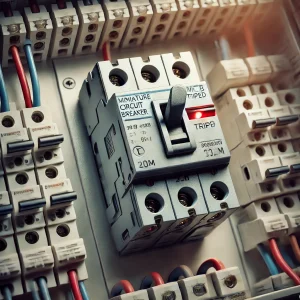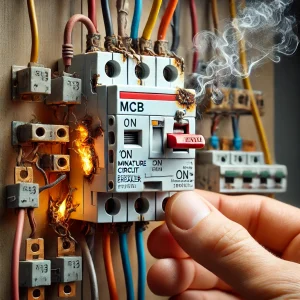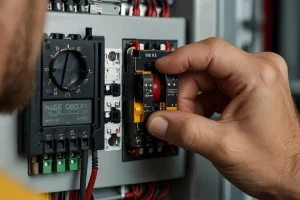MCB circuit breakers (miniature circuit breakers) are a must in modern electrical systems and protect circuits from overloads and short circuits. Any electronic part, however, is just as prone to malfunctioning with wear. This article will talk about typical problems linked to MCB circuit breakers and tips for troubleshooting them. In this section, we will discuss the various types of MCB, like mini circuit breakers (MCB), curve C circuit breakers, and D curve circuit breakers, followed by relay vs. circuit breakers systems as well.
[woo_product_slider id=”23717″]
MCB Circuit Breakers: Problems and Solutions
Frequent Tripping

The most simple fault that may arise with an MCB circuit breaker is Vector tripping which leads the switch to turn off its connected appliances frequently. This might be because of numerous reasons, some of them can be:
- Overloading: When the current exceeds the rating of the miniature circuit breaker, it frequently trips to prevent overheating and potential fires.
- Hot Wire Short-Circuits: If your hot wire touches the neutral or ground, it will suddenly allow a huge jump in current, which causes immediate tripping of the miniature circuit breaker (MCB).
- Ground Faults: Like a short circuit, ground faults happen when an energized wire touches any part of the grounded system, such as the metal outlet box.
MCB Fails to Trip

An MCB might not trip at all sometimes, despite a fault in some part of the wiring system, because:
- MCB Fault: The MCB itself can be damaged; that way, it will not work properly.
- Incorrect Rating: If the MCB is rated higher than what is actually required by that specific branch, then it won’t trip under normal conditions, either.
MCB Will Not Reset

After getting tripped, MCB should automatically reset itself back to its normal working position, but if it doesn’t, then there is something wrong, like:
- Persistent Fault: The fault still exists, i.e., the short circuit has not yet been completely removed.
- Faulty MCB: It got damaged during operation and couldn’t be reset again.
- Loose Connections: Loose connections lead to arcing, overheating, and eventually damage to the whole MCB circuit breaker. This may happen because of incorrect installation, vibrations in the panel board, etc.
MCB Making Noise
Unusual sounds, such as clicking, coming from your miniature circuit breaker suggest a problem inside it, such as internal arcing or loose components.
MCB Refuses to Trip
- Defective MCB: Swap the faulty MCB circuit breaker with another one. Ensure that the newly installed breaker is of the right type and rating.
- Wrong Rating: Use an MCB with the correct rating for the circuit. For instance, you can use a B-curve circuit breaker for residential circuits with resistive loads and a C-curve circuit breaker for inductive loads.
MCB Does Not Reset
- Persistent Fault– Before resetting the mini circuit breaker, troubleshoot and fix the root cause. This may entail checking wiring, outlets, and connected devices.
- Faulty MCB- If it does not reset even after dealing with the fault, consider replacing it.
Loose Connections
Verify that all connections are tight and that the wires have been fully pushed into the terminals.. Arcing and overheating can harm the MCB Circuit Breaker due to loose connections.
Noisy MCB
In the event that an MCB circuit breaker starts tripping or showing some unusual noise, this is a sign that there may be internal defects. If not, turn off the power and check for anything through the use of a tool or any troubleshooting device; in case it still doesn’t fade, disconnect the mini and replace it asap.
Additional Considerations
- Relay and Circuit Breaker Systems: Integrating a relay system with circuit breakers can sometimes improve protection and control over electrical circuits. Relays provide extra safety features while sometimes enabling the remote operation of breakers.
- MCB Types: The choice of an appropriate type for an MCB circuit breaker is very important for problem prevention. Certain applications require curve C circuit breakers or D circuit breakers ones since they help avoid nuisance tripping in circuits with different load types.
Conclusion
MCB Circuit Breakers are crucial in safeguarding electrical circuits; however, they can encounter problems like tripping too often, not tripping at all, and not being able to reset. Identifying what may cause these problems and how to rectify them ensures your electricity is secure and dependable. Always select the correct type of miniature circuit breaker for your needs, and if you have complicated relay or circuit breaker system installations, consult with an electrician. Regularly maintaining your system by replacing faulty parts in a timely fashion will keep it running well without risking safety.
